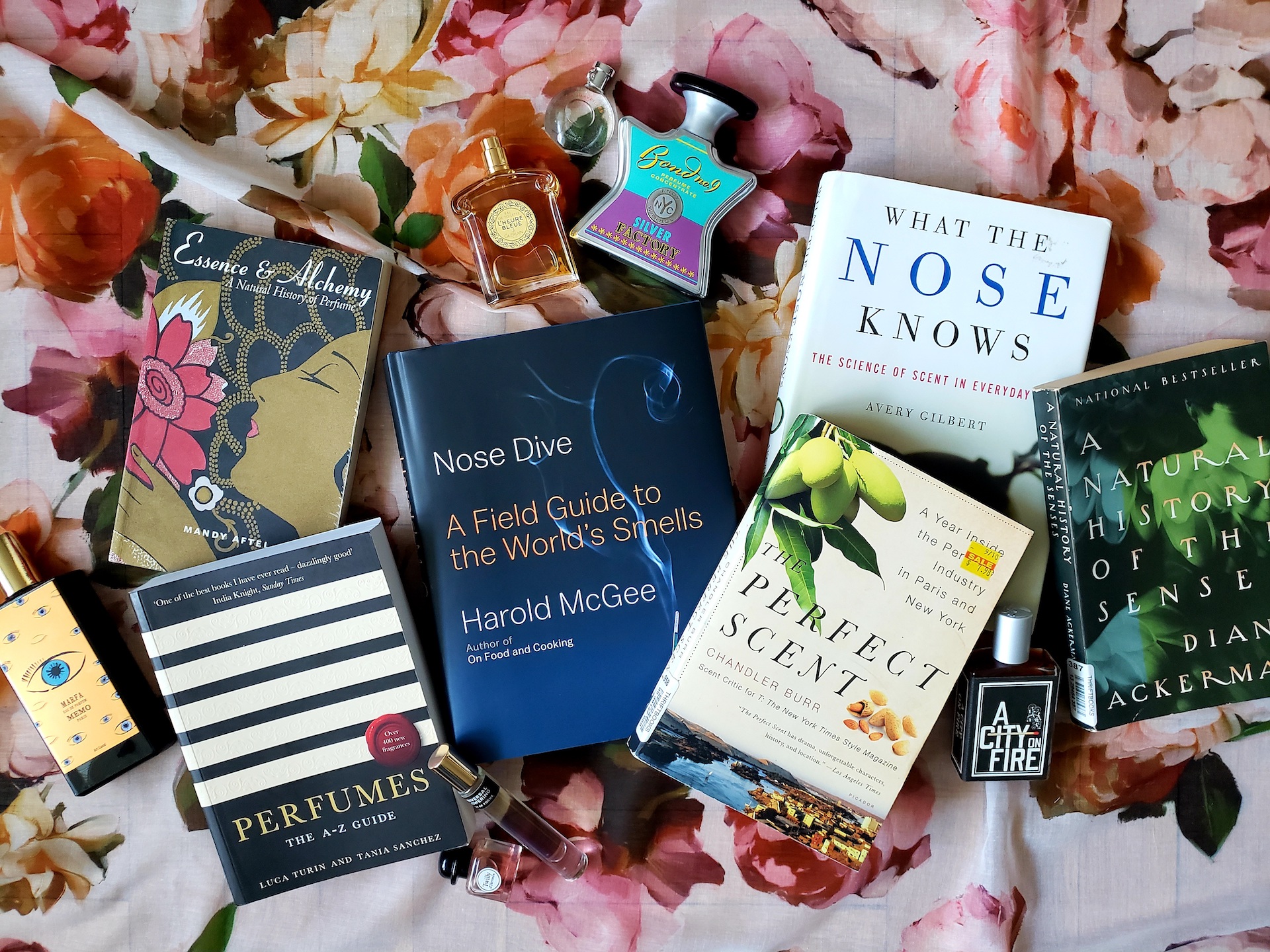We talk a lot about memoirs on the podcast and on our blog, but since it’s Nonfiction November I wanted to give some love to other types of nonfiction. When I become obsessed with a new interest I like to read as much about that thing as I can. Right now, it’s perfume. I want to know everything about it: the history, the cultural significance, the science behind it, how it’s made, and how to make it myself.
I began my journey into the world of perfume by taking online classes at the Institute for Art and Olfaction (IAO). They’re wonderfully affordable and cover a wide range of topics, from the history of specific scent categories to the process of setting up your own perfume lab. They also have a list of recommended books about perfume and scents. I’ve since purchased and procured six that I thought sounded most promising.
6 Books About Perfume and Scent to Tickle the Nose
These six books dive into the history and science of scent. A couple of them I’ve already read and the rest I’m eagerly anticipating. They all come recommended by the IAO as well.
1. Perfumes: The A–Z Guide by Luca Turin and Tania Sanchez
Luca Turin and Tania Sanchez’s guide is exactly what you’d expect from the title. It’s basically a dictionary of perfumes — mostly from well known perfume houses and designers, organized in alphabetical order — with accompanying reviews. Some of the reviews provide a brief history of the scent or a background on the perfumer, while others are scathingly hilarious.
Each review has a starred rating and scent notes (e.g., fruity floral, woody citrus, sweet fougère, etc.). Every five star scent is highlighted, so you can easily flip through and find their favourites. It’s an excellent reference guide and jumping off point for getting to know a fragrance. Every time I get a new sample or want to investigate a new perfume, Turin and Sanchez’s guide is the first thing I turn to.
2. Essence and Alchemy: A Natural History of Perfume by Mandy Aftel
Essence and Alchemy is not just a history of perfume, it’s also a guide to start creating your own scents from natural ingredients. It provides an excellent overview of perfume history and its use in different cultures. Aftel breaks down the three types of notes that make up a perfume—base, middle, and top—and how they function in a scent profile. She has a tendency to get a little too precious about the merits of naturals over synthetics for my taste, but overall it’s a fantastic book. I refer to it constantly when I’m blending my own fragrances.

3. A Natural History of the Senses by Diane Ackerman
Ackerman’s book is next on my to-read list. She takes readers through the history of all five senses: smell, touch, taste, hearing, and vision. Each of its five sections is further divided into smaller topics like “Pheromones,” “Kissing,” “Macabre Meals,” “Music and Emotion,” and “How to Watch the Sky.” Multiple people have recommended this book and it promises to be an engaging, sensual dive into the way humans experience the world.
4. The Perfect Scent: A Year Inside the Perfume Industry in Paris and New York by Chandler Burr
The Perfect Scent is another on my to-read list. Chandler Burr, perfume critic for the New York Times, spent a year following the creation of two very different perfumes — a celebrity fragrance for Sarah Jessica Parker and one commissioned by Hermès from perfumer Jean-Claude Ellena. Burr follows the fragrances from their initial concept all the way through creation to worldwide launch. Ultimately, it’s an inside story of the global perfume industry, a peak behind the curtain, that offers a glimpse at a process usually shrouded in mystery.

5. What the Nose Knows: The Science of Scent in Everyday Life by Avery Gilbert
Avery Gilbert takes a more scientific approach to smell and delves into culture from there. He takes a look at the molecules that make up different smells, and the connection between scent and taste, as well as between scent and memory. He examines the marketing of scent, looks back at Smell-O-Vision, and explores everything from the pleasant to the disgusting. As a smell scientist, he also tackles some of the more pervasive myths surrounding our sense of smell (for example, did you know the human nose is almost as sensitive as that of other animals?) and sheds some light on this misunderstood sense. I’m looking forward to diving into the science.
6. Nose Dive: A Field Guide to the World’s Smells by Harold McGee
Harold McGee is a James Beard award-winning author and an expert on the science of food and cooking. In Nose Dive, he turns that acuity to our sense of smell. Beginning in space with the creation of the universe and taking us through to the present day, McGee explores plant smells, animal smells, bodily smells, food smells, and everything in between. This is a story of the world through scent. It’s quite dense, and includes tables that break down plants and animals into their component smells and molecules, so it might be one that I read slowly, in bits and pieces, but it promises to be fascinating.
Sometimes It’s Good to be Nosy
Not nosy as in poking into other people’s private business, but nosy as in curious. There’s so much to learn about the world and so many books that can help you on your learning journey, no matter what interests you. I’m a student for life. I’d spend my days just learning new things and acquiring new skills if that were an option. For now, I’ll settle with getting my hands on as many books as possible.
What are your favourite nonfiction books? Tell us in the comments below!


